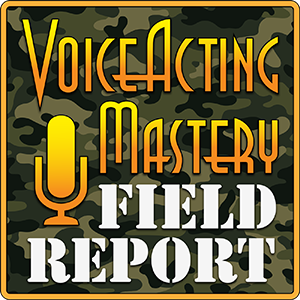VAM 121 | Q & A Session 23 – How to Expand Your Vocal Range & Change the Quality of Your Voice
Welcome to episode 121 of the Voice Acting Mastery podcast with yours truly, Crispin Freeman!
As always, you can listen to the podcast using the player above, or download the mp3 using the link at the bottom of this blog post. The podcast is also available via the iTunes Store online. Just follow this link to view the podcast in iTunes:
http://www.voiceactingmastery.com/podcast
In this episode, I continue answering questions from my podcast audience! For those who may not be as familiar with the podcast, in past episodes, I’ve given out a phone number where you can call in and leave me a question about voice acting as a voicemail. From time to time, I’ll pick the most relevant questions I receive and answer them here on the podcast.
For this round of Q & A, I answer questions from Adam from Scranton, PA and Matthew from Flagstaff, AZ.
Adam wants to know how he can expand his vocal range.
His is a very common question. I’m often asked by aspiring voice actors how they can expand their vocal range. Usually the question comes from male performers who want to know what they can do to lower or deepen their voice. I’ve almost never been asked how someone can learn to pitch their voice higher while voice acting. Now I’m not sure if Adam is specifically asking for advice on how to speak in lower tones, but allow me to address vocal range from a technical standpoint first. Then I’ll touch on some psychological issues that may be informing why I get asked this question so frequently.
Matthew wants to know how to change the timbre or quality of his voice.
I thought Matthew’s question was a great follow up to Adam’s about vocal range. Matthew uses the word “timbre” which is a very specific term that usually describes the tonality of an instrument. For instance, a violin and a trumpet might be able to play the same note or pitch, but the timbre or sonic quality of each instrument is very different. The technical reason for this has to do with the types of overtones or resonances that each instrument produces which give them their characteristic sounds. This means that you’d never mistake the sound of a violin for that of a trumpet because of their different timbres.
If Matthew will permit me, I’d like to use the term vocal quality in place of timbre in order to address his question. Based on the kinds of sounds he’s trying produce, I believe vocal quality is a more accurate description. Matthew says that he has difficulty performing a raspy character without hurting his voice or throat. Raspiness is more of a vocal quality than a timbre because it has less to do with overtones and more to do with breathiness, sibilance and other vocal qualities.
I help explain my approach to changing the quality of my voice and the importance of avoiding vocal injury when doing so!
I also recommend Kristin Linklater’s book, Freeing the Natural Voice.
If any of my listeners would like to call in with your own thoughts, thank you’s or questions, the number is:
323-696-2655.
Please don’t forget to include your first name and what city in the world you’re calling from. I’m looking forward to hearing from you!
Thanks for listening!
Download Voice Acting Mastery Episode #121 Here (MP3)
VAMFR 016 | Interview with Mela Lee, Part 1

VAMFR 016 | Interview with Mela Lee, Part 1
Welcome to episode 16 of the Voice Acting Mastery: Field Report podcast!
You can listen to the podcast using the player above, or download the mp3 using the link at the bottom of this blog post. The podcast is also available via the iTunes Store online. Just follow this link to view the podcast in iTunes:
http://www.vamfieldreport.com/podcast
In this episode our newest correspondent, Maureen Price is thrilled to share her interview with the multi-talented voice actress, vocalist, and songwriter, Mela Lee.
Mela’s roles in anime include Rin Tohsaka in Fate/stay night: Unlimited Blade Works, Yuki Cross in Vampire Knight, and Erika Karisawa in Durarara!! Mela also plays Tikki in Miraculous: Tales of Ladybug & Cat Noir. She has provided background voices on shows like Gotham, True Detective, and The Good Wife. Mela is also the vocalist and songwriter for her band Magnolia Memoir.
Maureen is so grateful to Mela for taking the time to share her insights on her voice acting journey.
In this episode, Mela talks about her entry into the entertainment industry. She had many ups and downs along the way as as she did her best to balance her voice over pursuits with her career as a financial analyst. Maureen and Mela also discuss the importance of cultivating a community of support and the power of being your own advocate. Lastly, Mela shares the evolution of her work as a vocalist and songwriter and how all of her many passions found a way to coalesce into a career path she molded for herself. This first section of the interview is full of great insights!
The VAM Field Report will be released on the 1st Wednesday of every month so stay on the look out for it!
Download VAM Field Report Episode #16 Here (MP3)
